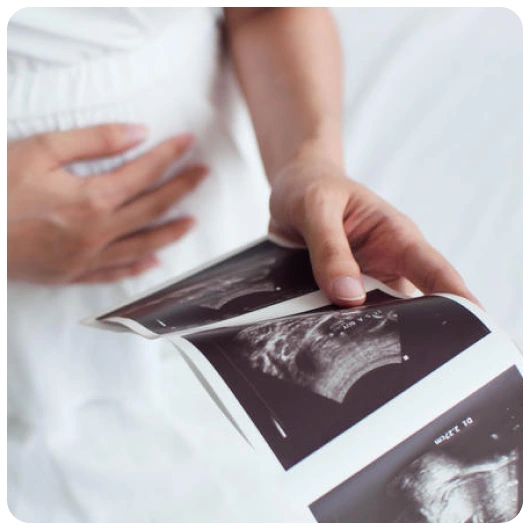Preeclampsia screening is vital in early pregnancy to detect and diagnose this condition. It includes a blood sample taken from the mother between 11 and 13+6 weeks of pregnancy.
The test measures levels of placental growth factor (PIGF) and serum pregnancy-associated plasma protein-A (PAPP-A). These results, along with blood pressure, weight, and family history, assess the risk of developing preeclampsia later.
Comprehensive Prenatal Care at Medicover
At Medicover Hospitals, we prioritize your prenatal well-being with advanced Preeclampsia Screening, making us the best choice for Preeclampsia Screening near you. Our comprehensive approach considers maternal risk factors, biomarkers, and biophysical tests.
Additionally, we offer preventive treatments like low-dose aspirin and calcium supplements to reduce the risk of preterm preeclampsia. Trust us to ensure a healthier pregnancy journey for you and your baby.
Importance of Early Detection
Preeclampsia is a significant contributor to maternal morbidity and mortality rates. Early detection is vital because it allows for timely intervention, potentially including birth before the due date, to reduce complications. The condition can rapidly develop into a severe disease, posing significant risks to both the mother and the newborn.
Health Risks and Complications
The mother and the newborn face substantial health risks if preeclampsia develops.
This condition can lead to severe and sometimes fatal outcomes if not managed promptly.
Preventative Treatments and Support
In addition to screening, Medicover's prenatal care includes preventive treatments aimed at reducing the risk of preeclampsia. Low-dose aspirin and calcium nutritional supplements are among the measures provided to help prevent the onset of preterm preeclampsia, ensuring better health for expectant mothers and their babies.
By offering advanced screening and preventative treatments, Medicover Hospitals ensures that expectant mothers receive the best possible care, reducing the risks associated with preeclampsia and promoting healthy pregnancies.

Why Choose Medicover Woman and Child Hospitals

0
+ Expert Doctors
0
+ NICU & PICU Support
0
K+ Normal Delivery
0
+ Beds FacilityFrequently Asked Questions
What is the screening test for pre-eclampsia?
Preeclampsia screening involves blood pressure measurements, proteinuria testing, and a Fetal Medicine Foundation triple test to detect and diagnose the condition early in pregnancy.
What are the stages of pre-eclampsia?
Eclampsia, a condition causing tonic-clonic seizures, is a two-phase process. The first phase involves facial twitching, rigidity, and muscular spasms, while the second phase begins in the jaw, spreads to the face and eyelids, and lasts around sixty seconds.
How much is a pre-eclampsia screening test cost?
The screening test cost for pre-eclampsia could be around 3300.
What is the name of the drug used for pre-eclampsia?
Magnesium sulphate, a small, colourless crystal, is used as an anticonvulsant, cathartic, and electrolyte replenisher in treating pre-eclampsia and eclampsia.
What is the normal range of pre-eclampsia?
Pre-eclampsia is considered normal when systolic blood pressure (SBP) or diastolic blood pressure (DBP) is at least 140 mm Hg or 90 mm Hg on two separate occasions, four hours apart.
Ready to take control of your health journey?
Book your appointment now and start your path towards wellness today!